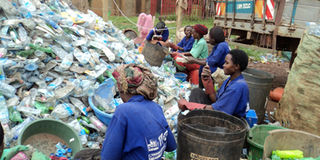Why plastic waste ban is not the way to go in curbing the menace

Women sorting plastics to be recycled. The Kenya government has banned the use of plastics. PHOTO | FILE
What you need to know:
- In 2007, the then-Finance minister banned polythene bags below 30 micron and introduced a 120 per cent excise duty.
- The plastics industry employs more than 60,000 people directly or 2.9 per cent of Kenya’s work force, according to the Kenya Association of Manufacturers.
- We need to give plastic waste and all other manufactured packaging waste a monetary value.
- Plastic is not the only non-biodegradable material that is being spewed out daily.
The intention by Prof Judi Wakhungu, the Cabinet Secretary for the Environment, to ban the use of plastics presents just one way to deal with the plastic waste menace.
It is, however, the most expensive and most drastic way out of this problem and is only designed to align Kenya’s plastic use position with those of the other East African Community states, especially Rwanda and Tanzania.
This will be the third attempt since 2005 for the Kenyan authorities to rein in the plastic bag menace with a plan to ban the use of plastic under 30 microns and create a plastic recycling plant. This failed.
In 2007, the then-Finance minister banned polythene bags below 30 micron and introduced a 120 per cent excise duty. This, too, failed.
In my view, Kenya only needs to think and act “outside the box” in dealing with both the plastic bag waste and the problem posed by other refuse. The answer, in my own thinking, is, indeed, VALUE.
We need to give plastic waste and all other manufactured packaging waste a monetary value. Today, for instance, it is quite difficult to find a metal product or scrap discarded anywhere in the country. Even a metal bolt or nut is these days quite difficult to find discarded in the garbage.
MARKET VALUE
This is because metal scrap has value. True, this had led to a problem of vandalisation of metal street lamps, road railings, signposts and so on, but it does demonstrate that Kenyans will collect anything and everything that has some value.
A perfect and simple solution exists to give plastic waste a market value that will entice many Kenyans to collect any and all the plastic and other waste that have become such a headache today.
Once collected the same can become available for reuse, recycle or conversion to energy and, or, disposal in other ways. This will keep the plastic industry in Kenya running, save those jobs that are now threatened, and also create thousands of jobs in the collection business and in processing of plastic waste and other refuse.
This, unlike the ban, is sustainable and immediately beneficial socially and economically to the country. Being a market economy, we should try market-based instruments before we go for such punitive administrative solutions with no guarantee that they will, indeed, work.
GOOD LESSONS
Kenya is a leader in the region and while we should not be averse to learning good lessons from our sister countries in the region, we need to thoroughly interrogate the impact and effect of a total ban on plastics and chart our own course.
In any case, the other EAC member states have not shown any aversion to putting their national interests ahead of regional considerations. Kenya needs to lead from the front in regard to this and other industrial issues. What we, as a country, need to ask ourselves before we ban plastics is: Will it solve the problem at hand or are we not closing the gate after the horse has bolted?
The plastics industry employs more than 60,000 people directly or 2.9 per cent of Kenya’s work force, according to the Kenya Association of Manufacturers. Why kill these jobs when we are so desperately trying to create new ones.
The informal sector, which is probably the largest agent for the distribution of the plastic bags depends on these products. There is no easy and effective alternative to the plastics. We, therefore, run the risk of exposing Kenyans to even greater health hazards compared to the gains we make from this industry.
Plastic is not the only non-biodegradable material that is being spewed out daily. There are glass bottles and there are polystyrene (styropor) cups and containers. There are also other coated-paper containers that do not easily degrade. Please, rethink the move to ban the use of plastics.
Mr Thiru is a business development consultant, based in Nairobi. [email protected]



